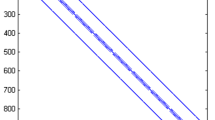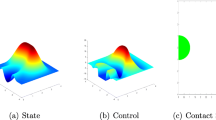Abstract
This paper analyzes two eXtended finite element methods (XFEMs) for linear quadratic optimal control problems governed by Poisson equation in non-convex domains. We follow the variational discretization concept to discretize the continuous problems, and apply an XFEM with a cut-off function and a classic XFEM with a fixed enrichment area to discretize the state and co-state equations. Optimal error estimates are derived for the state, co-state and control. Numerical results confirm our theoretical results.
Similar content being viewed by others
References
Apel T, Pfefferer J, Rösch A. Finite element error estimates for Neumann boundary control problems on graded meshes. Comput Optim Appl, 2012, 52: 3–28
Apel T, Rösch A, Winkler G. Optimal control in non-convex domains: A priori discretization error estimates. Calcolo, 2007, 44: 137–158
Apel T, Sändig A, Whiteman J. Graded mesh refinement and error estimates for finite element solutions of elliptic boundary value problems in non-smooth domains. Math Method Appl Sci, 1996, 19: 63–C85
Apel T, Winkler G. Optimal control under reduced regularity. Appl Numer Math, 2009, 59: 2050–2064
Babuška I, Banerjee U, Kergrene K. Strongly stable generalized finite element method: Application to interface problems. Comput Methods Appl Mech Engrg, 2017, 327: 58–92
Babuška I, Kellogg R B, Pitkäranta J. Direct and inverse error estimates for finite elements with mesh refinements. Numer Math, 1979, 33: 447–471
Babuška I, Lipton R. Optimal local approximation spaces for generalized finite element methods with application to multiscale problems. SIAM J Multiscale Model Sim, 2010, 9: 373–406
Babuška I, Melenk J M. The partition of unity method. Int J Numer Meth Eng, 1997, 40: 727–758
Babuška I, Rosenzweig M B. A finite element scheme for domains with corners. Numer Math, 1972, 20: 1–21
Becker R, Kapp H, Rannacher R. Adaptive finite element methods for optimal control of partial differential equations: Basic concept. SIAM J Control Optim, 2000, 39: 113–132
Belytschko T, Black T. Elastic crack growth in finite elements with minimal remeshing. Int J Numer Meth Eng, 1999, 45: 601–620
Belytschko T, Gracie R, Ventura G. A review of extended/generalized finite element methods for material modeling. Model Simul Mater SC, 2009, 17: 043001
Benedix O, Vexler B. A posteriori error estimation and adaptivity for elliptic optimal control problems with state constraints. Comput Optim Appl, 2009, 44: 3–25
Blum H, Dobrowolski M. On finite element methods for elliptic equations on domains with corners. Computing, 1982, 28: 53–63
Bordas S, Rabczuk T, Hung N X, et al. Strain smoothing in fem and XFEM. Comput Struct, 2010, 88: 1419–1443
Casas E. Control of an elliptic problem with pointwise state constraints. SIAM J Control Optim, 1986, 24: 1309–1318
Ciarlet P Jr, He J W. The singular complement method for 2d scalar problems. CR Math, 2003, 336: 353–358
Falk R S. Approximation of a class of optimal control problems with order of convergence estimates. J Math Anal Appl, 1973, 44: 28–47
Gong W, Yan N N. Adaptive finite element method for elliptic optimal control problems: Convergence and optimality. Numer Math, 2017, 135: 1121–1170
Grisvard P. Elliptic Problems in Nonsmooth Domains. Philadelphia: SIAM, 1985
Hintermuller M, Hoppe R H W. Goal-oriented adaptivity in pointwise state constrained optimal control of partial differential equations. SIAM J Control Optim, 2010, 48: 5468–5487
Hinze M. A variational discretization concept in control constrained optimization: The linear-quadratic case. Comput Optim Appl, 2005, 30: 45–61
Hinze M, Vierling M. The semi-smooth Newton method for variationally discretized control constrained elliptic optimal control problems: Implementation, convergence and globalization. Optim Method Softw, 2012, 27: 933–950
Kergrene K, Babuška I, Banerjee U. Stable generalized finite element method and associated iterative schemes: Application to interface problems. Comput Methods Appl Mech Engrg, 2016, 305: 1–36
Li R, Liu W B, Ma H P, et al. Adaptive finite element approximation for distributed elliptic optimal control problems. SIAM J Control Optim, 2002, 41: 1321–1349
Natarajan S, Mahapatra D R, Bordas S. Integrating strong and weak discontinuities without integration subcells and example applications in an XFEM/GFEM framework. Int J Numer Meth Eng, 2010, 83: 269–294
Nicaise S, Renard Y, Chahine E. Optimal convergence analysis for the extended finite element method. Int J Numer Meth Eng, 2011, 86: 528–C548
Persson P O, Strang G. A simple mesh generator in MATLAB. SIAM Review, 2004, 46: 329–345
Rösch A, Siebert K G, Steinig S. Reliable a posteriori error estimation for state-constrained optimal control. Comput Optim Appl, 2017, 68: 121–162
Rösch A, Steinig S. A priori error estimates for a state-constrained elliptic optimal control problem. ESAIM Math Model Num, 2012, 46: 1107–1120
Rösch A, Wachsmuth D. A-posteriori error estimates for optimal control problems with state and control constraints. Numer Math, 2012, 120: 733–762
Schatz A H, Wahlbin L B. Maximum norm estimates in the finite element method on plane polygonal domains. Math Comp, 1979, 33: 465–492
Schneider R, Wachsmuth G. A posteriori error estimation for control-constrained, linear-quadratic optimal control problems. SIAM J Numer Anal, 2016, 54: 1169–1192
Sevilla D, Wachsmuth D. Polynomial integration on regions defined by a triangle and a conic. In: Proceedings of the 2010 International Symposium on Symbolic and Algebraic Computation. New York: ACM, 2010, 163–170
Shen Y X, Lew A. Stability and convergence proofs for a discontinuous-galerkin-based extended finite element method for fracture mechanics. Comput Methods Appl Mech Engrg, 2010, 199: 2360–2382
Soghrati S, Geubelle P H. A 3d interface-enriched generalized finite element method for weakly discontinuous problems with complex internal geometries. Comput Methods Appl Mech Engrg, 2012, 217: 46–57
Strang G, Fix G J. An Analysis of the Finite Element Method. Englewood Cliffs: Prentice-Hall, 1973
Strouboulis T, Babuška I, Copps K. The design and analysis of the generalized finite element method. Comput Methods Appl Mech Engrg, 2000, 181: 43–69
Strouboulis T, Babuška I, Hidajat R. The generalized finite element method for helmholtz equation: Theory, computation, open problems. Comput Methods Appl Mech Engrg, 2006, 195: 4711–4731
Tiba D, Tröltzsch F. Error estimates for the discretization of state constrained convex control problems. Numer Func Anal Optim, 1996, 17: 1005–1028
Tröltzsch F. Optimal control of partial differential equations: Theory, methods and applications. SIAM J Control Optim, 2010, 112: 399
Ventura G. On the elimination of quadrature subcells for discontinuous functions in the extended finite-element method. Int J Numer Meth Eng, 2006, 66: 761–795
Yang C C, Wang T, **e X P. An interface-unfitted finite element method for elliptic interface optimal control problem. Numer Math Theor Meth Appl, 2019, 12: 727–749
Acknowledgements
This work was supported by National Natural Science Foundation of China (Grant No. 11771312).




